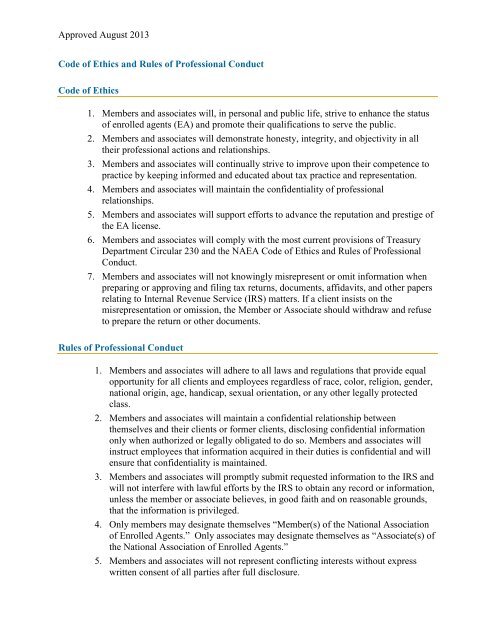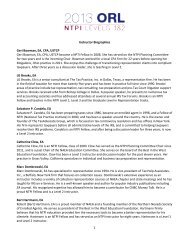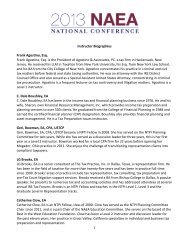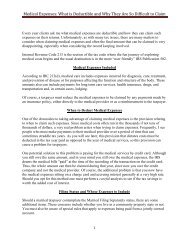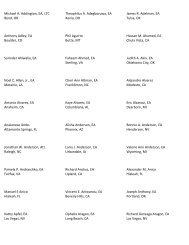Code of Ethics and Rules of Professional Conduct - - National ...
Code of Ethics and Rules of Professional Conduct - - National ...
Code of Ethics and Rules of Professional Conduct - - National ...
Create successful ePaper yourself
Turn your PDF publications into a flip-book with our unique Google optimized e-Paper software.
Approved August 2013<strong>Code</strong> <strong>of</strong> <strong>Ethics</strong> <strong>and</strong> <strong>Rules</strong> <strong>of</strong> Pr<strong>of</strong>essional <strong>Conduct</strong><strong>Code</strong> <strong>of</strong> <strong>Ethics</strong>1. Members <strong>and</strong> associates will, in personal <strong>and</strong> public life, strive to enhance the status<strong>of</strong> enrolled agents (EA) <strong>and</strong> promote their qualifications to serve the public.2. Members <strong>and</strong> associates will demonstrate honesty, integrity, <strong>and</strong> objectivity in alltheir pr<strong>of</strong>essional actions <strong>and</strong> relationships.3. Members <strong>and</strong> associates will continually strive to improve upon their competence topractice by keeping informed <strong>and</strong> educated about tax practice <strong>and</strong> representation.4. Members <strong>and</strong> associates will maintain the confidentiality <strong>of</strong> pr<strong>of</strong>essionalrelationships.5. Members <strong>and</strong> associates will support efforts to advance the reputation <strong>and</strong> prestige <strong>of</strong>the EA license.6. Members <strong>and</strong> associates will comply with the most current provisions <strong>of</strong> TreasuryDepartment Circular 230 <strong>and</strong> the NAEA <strong>Code</strong> <strong>of</strong> <strong>Ethics</strong> <strong>and</strong> <strong>Rules</strong> <strong>of</strong> Pr<strong>of</strong>essional<strong>Conduct</strong>.7. Members <strong>and</strong> associates will not knowingly misrepresent or omit information whenpreparing or approving <strong>and</strong> filing tax returns, documents, affidavits, <strong>and</strong> other papersrelating to Internal Revenue Service (IRS) matters. If a client insists on themisrepresentation or omission, the Member or Associate should withdraw <strong>and</strong> refuseto prepare the return or other documents.<strong>Rules</strong> <strong>of</strong> Pr<strong>of</strong>essional <strong>Conduct</strong>1. Members <strong>and</strong> associates will adhere to all laws <strong>and</strong> regulations that provide equalopportunity for all clients <strong>and</strong> employees regardless <strong>of</strong> race, color, religion, gender,national origin, age, h<strong>and</strong>icap, sexual orientation, or any other legally protectedclass.2. Members <strong>and</strong> associates will maintain a confidential relationship betweenthemselves <strong>and</strong> their clients or former clients, disclosing confidential informationonly when authorized or legally obligated to do so. Members <strong>and</strong> associates willinstruct employees that information acquired in their duties is confidential <strong>and</strong> willensure that confidentiality is maintained.3. Members <strong>and</strong> associates will promptly submit requested information to the IRS <strong>and</strong>will not interfere with lawful efforts by the IRS to obtain any record or information,unless the member or associate believes, in good faith <strong>and</strong> on reasonable grounds,that the information is privileged.4. Only members may designate themselves “Member(s) <strong>of</strong> the <strong>National</strong> Association<strong>of</strong> Enrolled Agents.” Only associates may designate themselves as “Associate(s) <strong>of</strong>the <strong>National</strong> Association <strong>of</strong> Enrolled Agents.”5. Members <strong>and</strong> associates will not represent conflicting interests without expresswritten consent <strong>of</strong> all parties after full disclosure.
6. Members <strong>and</strong> associates will not allow their related business interests to affectrepresentation <strong>of</strong> a client <strong>and</strong> must immediately disclose their interests whenreferring a client to another firm or enterprise for services.7. Members <strong>and</strong> associates will refuse any gift, favor, or hospitality that wouldinfluence or appear to influence their actions.8. Members <strong>and</strong> associates will take a position on a tax return favorable to their clientsonly if there is substantial authority that the position will be sustained on its merits,unless the position is disclosed <strong>and</strong> there is at least a reasonable basis for it. Ifapplicable law is unsettled, or the application <strong>of</strong> law to the facts in a given situationis uncertain, members <strong>and</strong> associates must explain the probable effects <strong>of</strong> variousalternatives to their clients who make the final decision as to the position taken.9. Members <strong>and</strong> associates will not knowingly, directly or indirectly, pr<strong>of</strong>essionallyassociate with an individual who has been suspended or disbarred.10. Members <strong>and</strong> associates will avoid any appearance <strong>of</strong> impropriety when paying oraccepting a commission to obtain a client, or to refer products or services.11. Members <strong>and</strong> associates who are engaged simultaneously in another occupationwill conduct themselves in such a manner that no conflict <strong>of</strong> interest exists whenrendering pr<strong>of</strong>essional tax service or pr<strong>of</strong>essional advice. No member or associatewill accept or pay a commission for the sale or referral <strong>of</strong> products or services to aclient unless they are properly licensed <strong>and</strong> all facts are fully disclosed in writing tothe client. No member or associate will pay a commission or referral fee to anemployee for the sale or referral <strong>of</strong> products or services to a client unless theemployee is properly licensed <strong>and</strong> the facts are fully disclosed in writing to theclient.12. Members <strong>and</strong> associates will not solicit clients in any manner prohibited by themost current provisions <strong>of</strong> Circular 230, including advertising or other forms <strong>of</strong>solicitation that present a false, misleading, or deceptive appearance.13. Members <strong>and</strong> associates will undertake only those tax matters which the member orassociate, or the member’s or associate’s firm, can reasonably expect to completewith pr<strong>of</strong>essional competence. Members <strong>and</strong> associates will obtain sufficientrelevant data to provide a reasonable basis for conclusions or recommendations asrequired to complete the task.14. Members <strong>and</strong> associates should be considerate <strong>and</strong> courteous in dealing withrepresentatives <strong>of</strong> governmental agencies. In practice, members <strong>and</strong> associates arerequired to provide all information required by a statute or regulations whenformally requested by the authorized governmental agency.15. Members <strong>and</strong> associates will not suggest or give the impression they can obtainspecial consideration from governmental agencies or their representatives because<strong>of</strong> prior IRS employment.16. Members <strong>and</strong> associates will advise a client, preferably in writing, if they suspectthe client may not have complied with the revenue laws or may have made an errorin, or omission from, a return, document, affidavit, or other paper the client isrequired by law to execute.
17. Members <strong>and</strong> associates will not represent a client, or will withdraw from clientrepresentation that has commenced, if:a. The representation will result in the violation <strong>of</strong> the rules <strong>of</strong> pr<strong>of</strong>essionalconduct or the law,b. The member's or associate’s physical or mental condition materially impairshis/her ability to represent the client,c. The client persists in a course <strong>of</strong> action involving the member’s orassociate’s services that the member or associate believes is criminal orfraudulent,d. The client has used the member’s or associate’s services to perpetrate acrime or fraud, ore. The member or associate is discharged.18. Members <strong>and</strong> associates may withdraw from representing a client if:a. The client insists on pursuing an objective that the member or associateconsiders imprudent,b. The client fails substantially to fulfill an obligation to the member orassociate regarding the member’s or associate’s services <strong>and</strong> has been givenreasonable warning that the member or associate will withdraw unless theobligation is fulfilled,c. The representation will result in an unreasonable financial burden on themember or associate,d. The representation has been rendered unreasonably difficult by the client, ore. Other good cause for withdrawal exists.19. If representation is terminated, a member or associate will take reasonable steps toprotect the former client’s interests including providing reasonable notice to allowretention <strong>of</strong> another practitioner, surrendering papers <strong>and</strong> property to which theclient is entitled, <strong>and</strong> refunding unearned advance fees.20. Members <strong>and</strong> associates will return to the client or former client all records or otherdata the client provided.21. Tax preparation or representation services will be <strong>of</strong>fered as authorized by the mostcurrent provisions <strong>of</strong> Circular 230.APPENDIX AI. GENERALThe Association is obligated to prescribe <strong>and</strong> enforce st<strong>and</strong>ards for its members <strong>and</strong>associates. Complaint procedures are outlined in Section III. Investigations <strong>and</strong> hearingsmay be held to determine if members <strong>and</strong> associates adhered to these st<strong>and</strong>ards. Therespondent respondent may resign at any stage <strong>of</strong> proceedings discussed below butNAEA has no obligation to suggest or accept such resignation.
II.III.DEFINITIONSA. Censure: The mildest form <strong>of</strong> discipline, this action is a warning or reprim<strong>and</strong>.B. Preponderance <strong>of</strong> Evidence: This is evidence that is more likely true than not.C. Complaint: A written statement that must contain a clear <strong>and</strong> concise statement<strong>of</strong> facts that a member or associate (now referred to as respondent respondent)violated the ethical st<strong>and</strong>ards set forth by this Association. The complaint mustinclude pertinent dates <strong>of</strong> the alleged unethical practice <strong>and</strong> be signed by thecomplainant(s), who may or may not be a member or associate <strong>of</strong> the Association.D. Conflict <strong>of</strong> Interest: A conflict <strong>of</strong> interest arises when any person involved in adisciplinary proceeding (other than the complainant or respondent respondent) hascompeting pr<strong>of</strong>essional or personal interests. Such competing interests can makeit difficult to fulfill the disciplinary duties impartially. A conflict <strong>of</strong> interest existseven if no unethical or improper act results from it <strong>and</strong> can create an appearance<strong>of</strong> impropriety that can undermine confidence in the process. Any conflict <strong>of</strong>interest will not deprive a party or witness the opportunity to be heard, but theconflict may be considered when evaluating the evidence.E. Expulsion: This includes loss <strong>of</strong> NAEA member or associate rights <strong>and</strong>privileges. Should proceedings result in expulsion, NAEA may disclose only thata person is no longer a member or associate.F. Fraud: This is a deliberate misrepresentation, by words or conduct that causesanother person to suffer damages, usually monetary damages. Fraud can also becommitted by false or misleading allegations or by concealing something thatshould be disclosed.G. Suspension: This is an intermediate form <strong>of</strong> discipline between censure <strong>and</strong>expulsion. A person who is suspended loses all rights <strong>and</strong> privileges <strong>of</strong>membership or association with NAEA for the period <strong>of</strong> suspension.H. Continuing Education (CE): Instruction that meets the IRS requirement for <strong>Ethics</strong>education.COMPLAINT PROCEDURESA. Initial H<strong>and</strong>ling <strong>and</strong> Review1. The Association’s executive vice president (EVP) receives all initialcomplaints. If a complaint is first received by a state affiliate’s leadershipor <strong>Ethics</strong> Committee, the complaint must be forwarded within ten (10)days to the NAEA EVP. The complaints will be reviewed for requiredinformation described in II. C. above. The EVP will acknowledge receipt<strong>of</strong> the complaint to the complainant within thirty (30) days. A completelog or diary must be maintained by the chair <strong>of</strong> the <strong>Ethics</strong> & Pr<strong>of</strong>essional<strong>Conduct</strong> Committee (E&PC). This log is open for inspection by E&PCCommittee members <strong>and</strong> the NAEA EVP or NAEA’s president uponwritten request.2. Every complaint will be reviewed <strong>and</strong> evaluated by the E&PC chair. Thechair <strong>and</strong>/or the E&PC Committee are not obligated to act on every
complaint received. The chair will report disposition <strong>of</strong> all complaints tothe NAEA EVP.3. The NAEA E&PC Committee chair will refer the complaint to thepresident <strong>of</strong> the relevant state affiliate. At any time the state affiliate canrequest that the NAEA E&PC Committee process the complaint.4. If the respondent respondent is an <strong>of</strong>ficer or director <strong>of</strong> the <strong>National</strong>Association <strong>of</strong> Enrolled Agents, the NAEA E&PC Committee alone willprocess the complaint.5. If the respondent respondent is an associate with no state affiliation, theNAEA E&PC Committee alone will process the complaint.B. InvestigationC. Hearing1. The state affiliate president or the NAEA E&PC Committee chair willnotify the respondent respondent in writing within thirty (30) days <strong>of</strong>receiving the complaint. The notice will advise the nature <strong>of</strong> the charge,the allegations supporting the charge, <strong>and</strong> will advise the respondentrespondent respondent <strong>of</strong> his/her rights under the disciplinary procedure.The notice will request a response within thirty (30) days.2. The state affiliate president or NAEA E&PC chair will appoint two NAEAmembers to investigate the charge. The investigating members will reportto the president or chair with a recommendation within sixty (60) days.1. Upon receipt <strong>of</strong> the investigative file, the state affiliate E&PC Committeeor NAEA E&PC Committee will notify the respondent the investigation iscomplete <strong>and</strong> <strong>of</strong>fer a hearing before the NAEA E&PC Committee. Therespondent must request a hearing within ten (10) days.2. If the respondent declines a hearing, or if the respondent fails to replywithin ten (10) days, the committee will issue findings <strong>of</strong> fact <strong>and</strong> arecommended decision as described in Section III.3. If the respondent requests a hearing, advance notice <strong>of</strong> the date, time, <strong>and</strong>place <strong>of</strong> the hearing will be provided at least thirty (30) days before thehearing.4. Only members <strong>of</strong> the state affiliate E&PC Committee or the NAEA E&PCCommittee will hear the matter. A Hearing Committee, consisting <strong>of</strong> atleast three members, will select a chair to preside at the hearing. Thehearing can be transferred to the NAEA E&PC Committee upon writtenrequest within fifteen (15) days <strong>of</strong> receipt <strong>of</strong> the respondent’s hearingrequest if the affiliate E&PC Committee is unable or unwilling to conductthe hearing. Hearing attendance is restricted to Hearing Committeemembers, the respondent, the respondent’s counsel (if applicable), thestate affiliate or national counsel (if applicable), <strong>and</strong> a transcriber. Otherpersons may be allowed to attend only by agreement with the E&PCCommittee <strong>and</strong> the respondent. Witnesses, including the complainant,will not be allowed to attend any part <strong>of</strong> the hearing in which they are not
directly involved. Evidence will be considered informally <strong>and</strong> hearsayevidence will be heard, but the Hearing Committee chair will excludeirrelevant or unduly repetitive testimony. The Hearing Committee chairmay restrict speakers’ time if restrictions are stated in advance <strong>of</strong> thehearing opening.5. The respondent will have the right to appear before the HearingCommittee in person, to be represented by counsel, to present witnesses,to make an opening statement, to examine <strong>and</strong> rebut unfavorable evidence,<strong>and</strong> to make a closing argument.6. The hearing will be recorded using a tape recorder or other recordingdevice. The verbatim transcription will be made by a person who is not amember or associate <strong>of</strong> NAEA. All documents accepted by the HearingCommittee chair will be made an <strong>of</strong>ficial part <strong>of</strong> the hearing record.7. The Hearing Committee will deliberate in executive session with no noncommitteemember present including the transcriber or any party to thehearing8. All rulings <strong>and</strong> decisions <strong>of</strong> the Hearing Committee chair that concernthese proceedings will be final <strong>and</strong> binding.IV.FINDINGS AND RECOMMENDATIONSA. Findings1. The only disciplinary actions that can be recommended are: dismissal,censure, suspension, or expulsion.2. When making a recommendation the E&PC Committee should considerall facts <strong>and</strong> circumstances it deems relevant, including but not limited tothe following (where applicable):a. The extent <strong>of</strong> the seriousness <strong>of</strong> the <strong>of</strong>fense, including whether itwas intentional fraud, negligent misrepresentation, or an innocentmistake.b. Whether this is the first <strong>of</strong>fense or complaint. If it is not the firstcomplaint, the E&PC Committee will also consider the date <strong>of</strong> thelast <strong>of</strong>fense <strong>and</strong> the nature <strong>of</strong> that <strong>of</strong>fense.c. Whether, <strong>and</strong> to what extent, others were harmed by the actions,including monetary loss or if there is physical injury, harm toreputation, loss <strong>of</strong> income, etc.d. Whether the respondent may be subject to other liability orpunishment.e. Whether, <strong>and</strong> to what extent, the respondent has been responsive to<strong>and</strong> cooperative with the investigation <strong>and</strong> hearing.f. Whether, <strong>and</strong> to what extent, the respondent made restitution tocomplainant(s).
B. Dismissalg. Whether, <strong>and</strong> to what extent, the respondent has been subject toprevious discipline by NAEA (or a state affiliate).h. Previous h<strong>and</strong>lings <strong>of</strong> similar cases.i. Whether there are any mitigating circumstances.1. After initial review <strong>of</strong> the complaint as set forth in III.A.2 above, theNAEA E&PC Committee chair may dismiss a complaint after consultingwith legal counsel or whomever is deemed appropriate.2. For purposes <strong>of</strong> illustration only <strong>and</strong> not intended to be a complete orexhaustive list, a complaint may be dismissed for the following reasons:a. Failure to state a claim on which relief can be granted.b. Basing a complaint on matters which are already covered byanother authority, jurisdiction, or regulated by law.c. Knowledge that the same acts or omissions alleged in thecomplaint are already the subject <strong>of</strong> another body’s investigation,discipline, or prosecution.d. Failure to allege a violation with specificity <strong>and</strong>/or with sufficientfacts, evidence, or detail to support the charge.e. Failure to comply with the requirements for a proper complaint,including complainant’s identity <strong>and</strong> signature.f. Legal counsel advises no further action should be taken on thecomplaint.3. A complaint may be deferred pending the action <strong>of</strong> another authority orjurisdiction the respondent is subject to.4. At any time during the investigative process, the state affiliate president orNAEA E&PC Committee chair may dismiss the complaint if the chair believes itis appropriate to do so under the same reasons given in IV.B.2. above.5. In the event the chair <strong>of</strong> the NAEA E&PC Committee or the state affiliatepresident dismisses the complaint, the NAEA E&PC Committee chair will notifythe complainant <strong>of</strong> such decision. Unless legal counsel recommends dismissal <strong>of</strong>the complaint, the complainant will be notified that the decision to dismiss may beappealed to the president <strong>of</strong> the Association, who after consulting with the E&PCCommittee chair may sustain or overrule the decision.6. If the E& PC Committee decides to dismiss the complaint, the decision isfinal. Notification <strong>of</strong> the complaint’s dismissal will be mailed to the state affiliatepresident, the respondent, the complainant <strong>and</strong> the NAEA EVP within ten (10)days.
C. Continuing EducationD. Censure1. In the event <strong>of</strong> any finding <strong>of</strong> a breach in <strong>Ethics</strong> <strong>and</strong> Pr<strong>of</strong>essional <strong>Conduct</strong>by a member, a remedy for the <strong>of</strong>fense will be two additional hours,annually, <strong>of</strong> ethics CE. The CE requirement will be for a three yearperiod, beginning after the board determination <strong>of</strong> violation for the<strong>of</strong>fense.2. This CE will be in addition to the IRS requirement <strong>of</strong> two hours <strong>of</strong> ethicsCE annually.3. This requirement will be in addition to possible censure or suspension4. The EVP shall review the member’s adherence to this requirement <strong>and</strong> inthe event the additional CE responsibility is not met, the EVP willrecommend expulsion to the board1. If the E&PC Committee recommends censure, a copy <strong>of</strong> the finding <strong>of</strong>fact <strong>and</strong> recommendation will be mailed to the respondent within fifteen(15) days.2. A censure must be in writing <strong>and</strong> clearly outline the consequences in theevent <strong>of</strong> a recurrence <strong>of</strong> the conduct.E. Suspension or Expulsion1. If the E&PC Committee recommends suspension or expulsion, a copy <strong>of</strong>its finding <strong>of</strong> fact <strong>and</strong> recommendation will be mailed to the respondent atleast fifteen (15) days prior to the effective date <strong>of</strong> suspension orexpulsion.2. Upon receipt <strong>of</strong> a state affiliate’s or NAEA E&PC Committee’s findings<strong>and</strong> recommendation for suspension or expulsion <strong>of</strong> a member orassociate, the NAEA President will call a meeting <strong>of</strong> the NAEA Board <strong>of</strong>Directors unless a regularly scheduled meeting is to be held within ninety(90) days to review the state affiliate’s or NAEA E&PC Committee’sfindings <strong>and</strong> recommendation. Excluded from this review will be all<strong>of</strong>ficers <strong>and</strong> directors from the state affiliate who participated inprocessing the case at the state level. The respondent may be heard at thissession, if so desired. All disciplinary action hearings will be held inclosed executive session.3. The NAEA Board, upon reviewing the investigative file <strong>and</strong>recommendation, will confirm, modify, or dismiss the recommendation <strong>of</strong>the state affiliate or NAEA E&PC Committee. In reviewing the findings<strong>and</strong> recommendation, the NAEA Board <strong>of</strong> Directors will consider the facts<strong>and</strong> circumstances as identified in Section III. A. 2. above. The decision<strong>of</strong> the NAEA Board is the final appeal <strong>of</strong> a decision to suspend or expel amember or associate.4. Suspension or expulsion will be done in good faith <strong>and</strong> in a fair <strong>and</strong>reasonable manner. A procedure is deemed fair <strong>and</strong> reasonable when it iscarried out according to the California Corporate <strong>Code</strong> for Nonpr<strong>of</strong>itsSection 5340-5342 <strong>and</strong>:
V. ADMINISTRATIVE DEMANDSa. It is done according to the NAEA bylaws.b. The respondent is given notice <strong>of</strong> the suspension <strong>and</strong> the reasonsfor the action at least fifteen (15) days before the suspension orexpulsion takes place.c. The respondent has an opportunity to be heard by a body or personauthorized to reverse the proposed suspension or expulsion. Theopportunity to be heard can be orally or in writing <strong>and</strong> must occurnot less than five days before the effective date <strong>of</strong> the suspensionor expulsion.A. Documents sent to the complainant or respondent as required by this <strong>Code</strong> mustbe mailed by USPS or sent by a private delivery service that providesconfirmation <strong>of</strong> delivery.B. No postponements or delays will be granted in the processing <strong>of</strong> a case unlessunusual circumstances arise.C. Any inspection or receipt <strong>of</strong> tax return information as a part <strong>of</strong> these procedureswill be in accordance with existing laws, rules, <strong>and</strong> regulations.D. Confidentiality will be established <strong>and</strong> maintained throughout the processing <strong>of</strong> acomplaint.E. The investigative file, including the hearing record, findings <strong>of</strong> fact, <strong>and</strong>recommendation, will be mailed to the state affiliate president <strong>and</strong> the NAEAEVP within fifteen (15) days <strong>of</strong> the hearing. If no hearing is held, theinvestigative file will be mailed within thirty (30) days <strong>of</strong> the investigation’scompletion. All duplicate records will be destroyed.F. Records <strong>of</strong> all proceedings under this <strong>Code</strong> will be sealed <strong>and</strong> retained at theNAEA national <strong>of</strong>fice <strong>and</strong> state affiliate headquarters for five (5) years from thedate <strong>of</strong> the final decision <strong>of</strong> the highest body to hear the matter. If no stateaffiliate headquarters exist, the NAEA national <strong>of</strong>fice will serve as custodian. Ifno legal action has been instituted for reinstatement within that time, all recordswill be destroyed by the EVP. No records will be destroyed while any legal actionis pending.G. In the event <strong>of</strong> a conflict <strong>of</strong> interest or bias among any person serving in anycapacity in a proceeding, that person will recuse him/herself from participation.H. No E&PC Committee member or state affiliate E&PC committee member will becompensated for their time in this service. The respective convening authoritywill be responsible for charges incurred during conduct <strong>of</strong> its business. NAEAwill reimburse NAEA E&PC Committee members for travel, lodging, <strong>and</strong>mailing in accordance with NAEA policies <strong>and</strong> procedures. The state affiliatewill reimburse its E&PC Committee members in accordance with its ownst<strong>and</strong>ing rules <strong>and</strong> procedures.I. Any state affiliate board <strong>of</strong> directors that wishes to have a st<strong>and</strong>ing committee forethics <strong>and</strong> pr<strong>of</strong>essional conduct must adopt the NAEA <strong>Code</strong> <strong>of</strong> <strong>Ethics</strong> <strong>and</strong> <strong>Rules</strong><strong>of</strong> Pr<strong>of</strong>essional <strong>Conduct</strong> or ethics <strong>and</strong> pr<strong>of</strong>essional conduct rules that are at least
as comprehensive as NAEA’s, <strong>and</strong> “fair <strong>and</strong> reasonable” procedures. This “fair<strong>and</strong> reasonable” criterion requires the code, rules <strong>and</strong> procedures to be either setforth in the state affiliate bylaws, adopted by reference in the state affiliatebylaws, or sent annually to all members or associates within the state affiliate.


